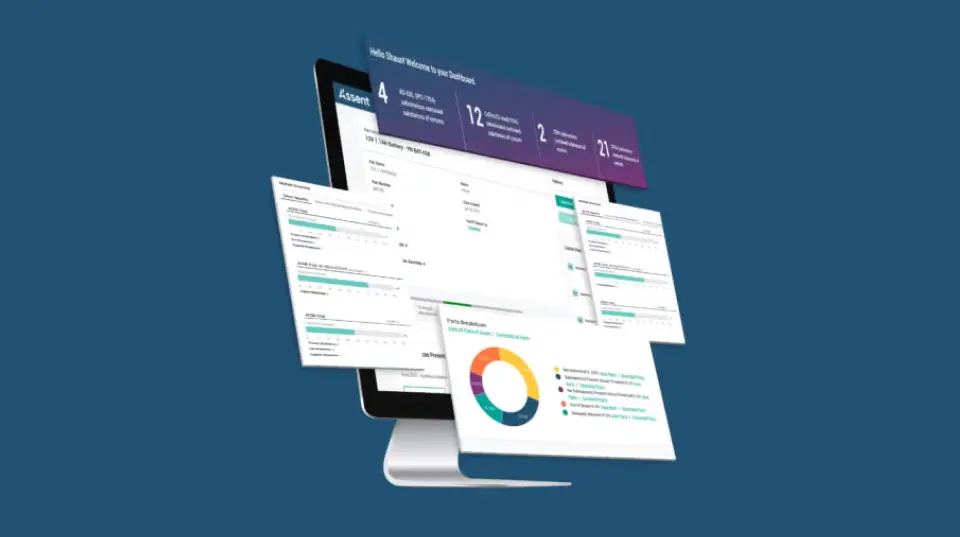The Association of Equipment Manufacturers (AEM) has published the Heavy Equipment Declarable Substances List (HEDSL) — a sign that the heavy equipment industry has taken a major step in streamlining product compliance management across its global supply chains..
According to the AEM, there are currently more than 3,000 different regulatory surveys being sent out to suppliers, contributing to growing complexity and resource costs for manufacturers. To remedy this, a committee of heavy equipment manufacturers has collaborated to create the HEDSL. This isn’t a new concept. The HEDSL functions similarly to the Global Automotive Declarable Substances List (GADSL), which was first introduced in 2005.
Here’s what you need to know about the HEDSL.
What is the HEDSL?
The HEDSL is a new substance reporting framework that harmonizes the multiple regulatory lists used by the heavy equipment industry, giving businesses one source of truth to reference for chemicals of concern, applicable threshold limits, and justifications for inclusion on the list. Its goal is to lessen the regulatory burden on the entire industry and its suppliers.
By surveying suppliers against one centralized list rather than multiple regulatory lists across the year, manufacturers should be able to streamline their supply chain data collection. Suppliers, in turn, can expect to receive fewer requests overall, though they will need to familiarize themselves with the HEDSL so they can respond accordingly.
What’s Covered by the HEDSL?
The HEDSL unifies many regional and global regulatory lists, including (but not limited to):
- EU Registration, Evaluation, Authorisation, and Restriction of Chemicals (REACH)
- U.S. Toxic Substances Control Act (TSCA)
- The Canadian Chemical Management Plan
- Japan’s Chemical Substances Control Law
- California Proposition 65
It includes over 6,400 entries, with CAS numbers and threshold reporting values. The substances included in the HEDSL are managed under one or more product compliance or product safety regulations. Although not every heavy industry manufacturer will be in scope of every regulation covered by the HEDSL (depending on which markets they serve), using the HEDSL will still save time and effort overall when collecting data from the supply chain.
How Does the HEDSL Affect Me?
As mentioned, if you’re a heavy equipment manufacturer, the HEDSL should streamline your data collection efforts.
If you’re a supplier to heavy equipment manufacturers, you should expect to receive data requests aligned with the HEDSL. You’ll need to know if you’re providing any materials or parts containing substances included on the HEDSL. Additionally, suppliers can use the list to survey their downstream suppliers for component substance content.
Suppliers who aren’t equipped to respond to the HEDSL customer requests will likely find themselves losing ground to other businesses that are faster to adopt this new standard.
When Does the HEDSL Take Effect?
The HEDSL was published in August 2024, and became immediately available for use by the heavy equipment industry. Because it is a list of substances regulated under other government lists, the HEDSL itself has no specific deadlines or effective periods. Instead, any business using it should ensure they are using the most recent version, as the AEM will update the HEDSL to reflect changes to regulations governing in-scope substances.
Refer to the AEM’s official website to download the latest version of the HEDSL.
Are There Fines Associated With the HEDSL?
No, the HEDSL is overseen by a committee of non-regulatory industry representatives who do not have the legal authority to issue fines or penalties. The HEDSL is simply a tool to help heavy equipment manufacturers and their suppliers streamline compliance with the complex network of overlapping regulations that already exist.
Failing to comply with a substance regulation, such as REACH, can result in fines or lost market access, but these are issued by the government body responsible for the regulation.
How Can Assent Help?
Assent’s product compliance solutions already cover many of the global and regional regulations that include substances listed in the HEDSL, such as REACH, RoHS, TSCA, and Proposition 65. By using Assent, you can stay ahead of the evolving regulatory landscape, ensuring your program aligns with the latest standards and best practices.
To learn more about how Assent is helping the heavy equipment industry, check out our on-demand webinar with the AEM — Tackling PFAS Challenges With AEM: Practical Solutions for Supply Chain Sustainability Success.














